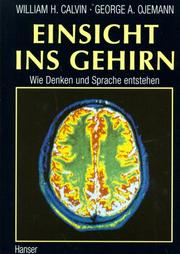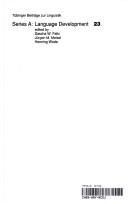| Listing 1 - 10 of 34 | << page >> |
Sort by
|

ISBN: 3446182721 Year: 1995 Publisher: München : Carl Hanser,
Abstract | Keywords | Export | Availability | Bookmark
 Loading...
Loading...Choose an application
- Reference Manager
- EndNote
- RefWorks (Direct export to RefWorks)
Book
ISBN: 3190069506 9783190069507 Year: 1988 Publisher: Ismaning Hueber
Abstract | Keywords | Export | Availability | Bookmark
 Loading...
Loading...Choose an application
- Reference Manager
- EndNote
- RefWorks (Direct export to RefWorks)
Book
ISBN: 3170872354 9783170872356 Year: 1971 Volume: 71 Publisher: Stuttgart Kohlhammer
Abstract | Keywords | Export | Availability | Bookmark
 Loading...
Loading...Choose an application
- Reference Manager
- EndNote
- RefWorks (Direct export to RefWorks)
Psycholinguistics --- Psycholinguistics. --- Psycholinguistik
Book
ISBN: 3846750956 Year: 2012 Publisher: Paderborn Brill | Fink
Abstract | Keywords | Export | Availability | Bookmark
 Loading...
Loading...Choose an application
- Reference Manager
- EndNote
- RefWorks (Direct export to RefWorks)
Sprechen und Denken - ein schwieriges Verhältnis. Wie formt die Sprache unser Denken, und was gewinnen und was verlieren wir dabei?Nicht alles Denken ist sprachliches Denken. Bilder und Klänge, Geräusche und Gefühle, Gesichter und Gebärden und vieles andere mehr: all dies taucht in unseren Vorstellungen auf und mischt sich in unser Denken ein. All diesem ist aber eines gemeinsam: Man kann es mit dem Mantel der Sprache umkleiden und es damit in eine Form, eine Form aus Wörtern, bringen. Durch diese Form können wir im Reich der Wörter Querverbindungen ziehen und Zusammenhänge stiften. Im Reich der Wörter kann das sprachliche Denken auf diese Weise Sinnverhältnisse gründen. Aber verblendet uns nicht auch der Wortzauber? Die Form, die wir in unserem Denken durch ihn gewinnen: Ist sie das Ereignis einer lebendigen Sinnentstehung in unserem Denken oder einer Sinnverödung in toten Formeln?
Sprachphilosophie --- Sprache --- Psycholinguistik --- Philosophie
Book
ISBN: 3541142413 9783541142415 Year: 1985 Publisher: München ; Baltimore : Urban & Schwarzenberg,
Abstract | Keywords | Export | Availability | Bookmark
 Loading...
Loading...Choose an application
- Reference Manager
- EndNote
- RefWorks (Direct export to RefWorks)
Psycholinguistics. --- Psycholinguistics. --- Psycholinguistics. --- Psycholinguistik. --- Psycholinguistique. --- psycholinguistics.
Book
Abstract | Keywords | Export | Availability | Bookmark
 Loading...
Loading...Choose an application
- Reference Manager
- EndNote
- RefWorks (Direct export to RefWorks)
Psycholinguistics. --- Psycholinguistics. --- Psycholinguistik. --- Psycholinguistik. --- Psychologie. --- Psychologie. --- Sprachstörung. --- Sprachstörung. --- Versprechen (Linguistik). --- Versprecher.
Book
ISBN: 9781405198622 1405198621 1444344587 1444344323 9786613274182 1283274183 1444344595 1444344579 Year: 2012 Publisher: Malden, Mass. Wiley-Blackwell
Abstract | Keywords | Export | Availability | Bookmark
 Loading...
Loading...Choose an application
- Reference Manager
- EndNote
- RefWorks (Direct export to RefWorks)
"This textbook offers a cutting edge introduction to psycholinguistics, exploring the cognitive processes underlying language acquisition and use. Provides a step-by-step tour through language acquisition, production, and comprehension, from the word level to sentences and dialogue Incorporates both theory and data, including in-depth descriptions of the experimental evidence behind theories Incorporates a comprehensive review of research in bilingual language processing, sign language, reading, and the neurological basis of language production and comprehension Approaches the subject from a range of perspectives, including psychology, linguistics, philosophy, computer science, neurology, and neurophysiology Includes a full program of resources for instructors and students, including review exercises, a test bank, and lecture slides, available upon publication at www.wiley.com/go/traxler "--
Psycholinguistics --- LANGUAGE ARTS & DISCIPLINES --- Languages. --- Psycholinguistics. --- Psycholinguistik. --- Språkpsykologi. --- Linguistics --- Psycholinguistique

ISBN: 3823347209 9783823347200 Year: 1998 Volume: 23 Publisher: Tübingen : Gunter Narr Verlag,
Abstract | Keywords | Export | Availability | Bookmark
 Loading...
Loading...Choose an application
- Reference Manager
- EndNote
- RefWorks (Direct export to RefWorks)
Agrammatism --- Speech disorders in children --- Neurolinguistics --- DEUTSCHE SPRACHE --- PSYCHOLINGUISTIK --- SPRACHSTÖRUNGEN
Book
ISBN: 1107419867 9781107419865 Year: 2014 Publisher: Cambridge : Cambridge University Press,
Abstract | Keywords | Export | Availability | Bookmark
 Loading...
Loading...Choose an application
- Reference Manager
- EndNote
- RefWorks (Direct export to RefWorks)
The relationship between memory and language and the topic of bilingualism are important areas of research in both psychology and linguistics and are grounded in cognitive and linguistic paradigms, theories and experimentation. This volume provides an integrated theoretical/real-world approach to second language learning, use and processing from a cognitive perspective. A strong international and interdisciplinary team of contributors present the results of various explorations into bilingual language processing, from recent advances in studies on bilingual memory to studies on the role of the brain in language processing and language forgetting. This is a strong yet balanced combination of theoretical/overview contributions and accounts of novel, original, empirical studies which will educate readers on the relationship between theory, cognitive experimentation and data and their role in understanding language learning and practice
Zweisprachigkeit. --- Gedächtnis. --- Kognition. --- Psycholinguistik. --- Bilingualism --- Cognition. --- Memory. --- Psycholinguistics. --- Psychological aspects.
Book
Year: 1885 Publisher: Halle, : M. Niemeyer,
Abstract | Keywords | Export | Availability | Bookmark
 Loading...
Loading...Choose an application
- Reference Manager
- EndNote
- RefWorks (Direct export to RefWorks)
Language and languages. --- Psycholinguistik. --- Quelle. --- Sprachtheorie. --- Wegener, Philipp,
| Listing 1 - 10 of 34 | << page >> |
Sort by
|

 Search
Search Feedback
Feedback About UniCat
About UniCat  Help
Help News
News